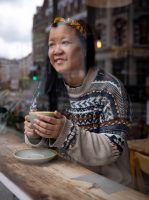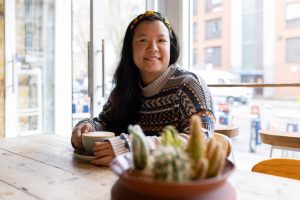Jan is currently an anaesthetic specialty trainee. Her HEE Improving Global Health placement in East London in South Africa was from August 2019 until the end of January 2020. She was at the mid-career stage during the gap between core training and registrar years, and was one of the last within the scheme ‘Improving Global Health’ to do in-country placement. She chose her placement location, as she was interested in Africa, and the project set up in East London appealed to her. She was also aware that the programme was in place for several years and was successful in providing suitable placements in South Africa.
She also felt due to her ethnicity (Chinese) that placements in Myanmar or Cambodia would be less conducive for geo-political, cultural, gendered, ethical and clinical independence reasons.
“…also not have the do cultural context to make those decisions. And that was my major concern in terms of there are certain times medical decisions are very tenuous and it dependent geopolitically you stand in the world and as unfair as it sounds, that’s part of the whole healthy.”

She felt it was a good approach for HEE to provide detailed immersive induction training in terms of physical, mental and emotional health, and for placement to be organised in pairs. This emotional preparedness training was in her view of utmost importance. She also feels that it is important to have good mentoring in place to support placement decisions and experiences, particularly with regards to employment roles, hierarchies and various cultural practices.
“They did a very, very good induction program. It wasn’t sitting through a series of lectures. There was a whole host of discussions about the cultural nuances that you might be faced with, probably drawn from people’s experiences from before. A lot of discussions about how you’re gonna do it. And then the thing that stood out for me for the HEE was because they have a very good mentoring program and it makes sure that they have a coach, whatever you like to call it. They merge and they flip their roles depends on what you need during the time. They make sure that you had four to six weekly chats with them so they know your well-being is fine.”
The paperwork in the placement experience was very fulfilling but quite heavy in terms of developing project plans, and writing interim and final reports. She described various challenges as a Asian woman working in the field of anaesthesia, and observed growth in her independence and skills in navigating prejudice in the workplace.
“I’m not losing hope, but it’s all through these experiences that I realise actually what I’ve learned from South Africa is very translatable to the workplace. South Africa is very in sync with how I am. I’m very direct, borderline blunt and South Africa is quite a blunt country. I’m allowed to say and people say it how it is. They also appreciate you saying it how it is.”
She felt that as a Chinese female professional and as the first Chinese HEE fellow she was able to manoeuvre the existing colourised dynamics in the East London hospital.
“I just brought some sort of freshness in terms of neither white nor black sort of opening up the channel. Open up the discussion, there could be Chinese-looking people that speak English as well as the British way. So I like opening up that conversation. There’s a lot of emotions that come up either with people living or people dying in our clinical work, and you just learn to become quite level and level-headed. When someone is raising their voices, you can say to them, ‘You said this. But you did not say this. Can you tell me which one you want me to respond to and talk about?’”
She was aware from the outset and quickly adapted and leveraged local dynamics to support her project. This project is now scalable and sustainable.
“From the get-go, I got locals, from different ethnicities, to know the intricacy of my project, so that when I left it was doing the same and it had been by the next two remote and fellows. So I was quite lucky in that sense that.”
As an IGH Champion Jan has now progressed to acting as a mentor and supporting others in their global health placements, and is an International Fellow for the Association of Anaesthetists in the International Relations Committee. She is highly positive about the value and meaning of global health opportunities and encourages colleagues to consider a stint overseas, and travel by overseas colleagues to UK placement sites.
Before she travelled to South Africa, she had completed a Postgraduate Diploma in Medical Education. She would like to progress further in clinical practice and/or education and is currently supporting African clinicians in their mentoring and training of colleagues.
“And my next opportunity I’m thinking I’ll probably want to do something related to anaesthetics, either be clinically or short stints of teaching. I’m going to Uganda for a couple of days in April, helping teaching ultrasound guided regional anaesthetic as well as advanced airway. And we are going to film them using virtual reality. I am really cautious about this whole white person going to teach things. So I’m a mere organiser and I’ve got African faculty from different African countries who have better regional anaesthetic skills to come to Kabale and teach.“

“So I think that’s a little bit better. Still. West Africa is very different from East Africa. It’s very different from South Africa, much like the neighbouring countries, between Uganda and Rwanda.”